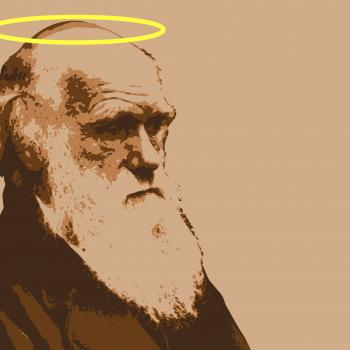Jonathan Morgan

For half a decade, the cognitive science of religion has sought the evolutionary origins of religious belief. This burgeoning field has some deep and convincing explanations, but it may also stigmatize atheists as aberrations of evolution. Now, psychologists are countering this stigma by tracking the personality traits that naturally facilitate atheism. Their work gives us a personality profile that neutralizes atheism as one of many expected worldviews in any healthy, diverse community.
One explanation for the origin of religious belief is the Hyperactive Agency Detection Device hypothesis, or simply HADD. The argument is that our high-strung ancestors who assumed there was a predator behind snapping twigs or rustling bushes were more likely to survive than their laidback, if more often right, cousins. So attributing agency to events is adaptive. Therefore as a byproduct, or spandrel, of this tendency, when we look at a starry night or storm clouds we assume that there must be some powerful agency behind these natural phenomenon. Our tendency to believe there’s a tiger in the rustling bushes translated into believing there’s a supernatural God, or gods. But does this mean non-belief is unnatural?
Many psychologists have argued yes. Jesse Bering and Justin L. Barrett, psychologists working in the cognitive science of religion, are two of the more vocal advocates. They each argue that our brains have been programmed by evolution to believe in supernatural entities. In other words, our cognitive defaults are set to religious belief in a supernatural über-mind (or minds) guiding the world. Which means that atheists are constantly working against the mind’s tendency to believe that coincidences are meaningful or that there is indeed a tiger in the bush. Their argument adds “unnatural” to the atheist’s already prodigious list of defamations.
For a long time sociologists have held a more favorable, or at least neutral, view of atheists. What is natural depends entirely on the culture you find yourself in. So non-belief may be completely natural in some cultures but not others. What makes a conducive culture for non-belief can vary widely. A thoroughly secular culture may foster non-belief, but a culture where religion is expressed in a hateful way may also lead to atheism. Predicting how a culture will guide personalities is incredibly complex.
But in a recent article for the journal Religion, Brain, & Behavior, Catherine Caldwell-Harris, a psychologist at Boston University, offers a helpful first step. Past research has linked agreeableness and conscientiousness with belief. In her work, Caldwell-Harris has gathered the personality traits that facilitate non-belief. Given a conducive culture, someone with these traits is likely to be an atheist. The added benefit of this understanding is that it explains away the nasty assumption that atheists are unnatural.
To create this profile, she’s pulled from research in sociology and psychology and condensed the findings into three categories: atheists are likely to be highly individualistic, systematic thinkers, with a penchant for pragmatism. Of course this profile is no guarantee of non-belief, but it’s a good predictor.
Individualism is not just the tendency to dislike family picnics (although research confirms that atheists are less enthusiastic about such gatherings!). This category also involves an internal locus of control and tendency towards non-conformity. On “Big Five” personality questionnaires, atheists rank more open to new experience than believers which often translates into individualism. All that is very glowing, but the downside of individualism is that non-believers report receiving less social support than believers.
If you ask atheists why they don’t believe in God, their systematic thinking will shine. In their 2006 groundbreaking study of nonbelievers, Hunsberger and Altemeyer, two Canadian psychologists, recorded the responses: “How is it possible that people who had just crossed the Red Sea and eaten manna from heaven built a golden calf just because their leader was a few hours late returning from his appointment with the Almighty? Why was genocide OK for King Saul but not for Hitler?” This response is exceptionally feisty, but it highlights the common use of rationality that most atheists appeal to when dismissing belief. This fondness for logic and skepticism also helps explain the over-representation of atheists in academia and scientific fields.
Being drawn to science is all the more likely given what Caldwell-Harris describes as a focus on “pragmatic here-and-now problem solving.” This trait is especially important for reversing the stereotype that non-believers are not concerned with the meaning of life. Instead of finding meaning by investing the everyday with a sense of the sacred, atheists tend to find meaning in the here-and-now, in this world. This characterization is supported by previous research arguing that secular people are more concerned about social justice, environmentalism and a more inclusive altruism. Humanists won’t be surprised by this category.
In fact, none of these traits are particularly surprising. They certainly don’t guarantee non-belief, but these strands of personality give a fair characterization of the vocal atheists in our culture and their less vocal counterparts living right next door.
Most importantly, this profile helps argue that atheism is an expectable worldview. In other words, it is just as natural as belief. Certain traits may have had an evolutionary advantage in the past, but diversity is the fodder of evolution. The diversity of personalities in our communities is not only adaptive – this diversity gives our social fabric its beauty. Caldwell-Harris makes the convincing case that atheists are one expected, natural strand in the fabric of a community. Perhaps the health of a community can be judged by how freely these personalities are able to express themselves.











